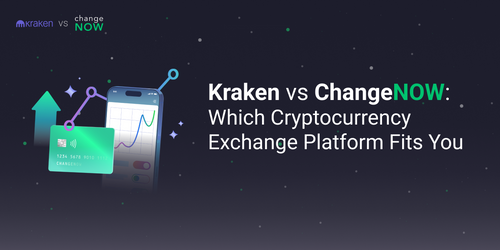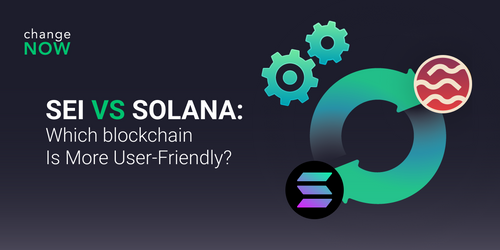Blockchain vs Traditional Banking in 2026: Why Non-Custodial Exchanges Are Changing the Game
Imagine you need to swap BTC to ETH, convert fiat to crypto, or exchange assets internationally. Traditional banks may take days, charge high fees, and require lengthy KYC. Non-custodial exchanges like ChangeNOW allow you to swap from crypto to top DeFi coins instantly, safely, and without custody risk.

In 2026, transfers still rely on complex multi-step infrastructures. Behind every digital confirmation sits a chain of intermediaries, compliance checkpoints, and centralized ledgers trying to reconcile the flow of assets. Cross-border payments still hop through SWIFT/GPI rails, Open Banking APIs, and mandatory KYC/AML gates. Central Bank Digital Currencies (CBDCs) like the digital euro or e-rupee are speeding their rails, but fees, transfer limits, and regulatory friction keep transactions from being truly frictionless.
Interest rates, settlement windows, and top-down approvals all shape the velocity of assets. A real-time balance doesn’t guarantee liquidity – funds often linger in limbo until every node clears the transaction. Even the AI-driven fraud monitoring and blockchain inspired reporting traditionally remain hierarchical and permission-based, where the user’s freedom to move value is constrained by institutional rules.
For crypto-savvy users, this opens the door to non-custodial platforms. Need to convert fiat to DeFi tokens or send value internationally? Banks may take days, with opaque fees and multiple ID checks. Crypto exchanges allow users to swap crypto quickly, often within minutes, with transparent fees, minimal custody risk, depending on the network conditions.
Blockchain and DeFi solutions in 2026 offer a faster, cheaper, and more transparent alternative.
In this article, we compare banks and crypto exchanges, highlighting them as fast, reliable, and cost-effective platforms for starting your crypto journey.
Key Takeaways
- Instant swaps on the financial rails of tomorrow: move crypto globally in minutes, not days.
- Full control, zero custody risk: your assets stay yours, from BTC to DeFi tokens.
- AI-driven liquidity and smarter finance: automation and analytics optimize trading, lending, and risk management.
- Security meets innovation: real-time monitoring, fraud detection, and recovery tools ensure safe navigation in DeFi.
Inside the Banking Machine
The fastest transactions in modern banking are powered by a complex, still flexible system of intermediaries and regulations. Despite digitalization, banks still rely on complex internal accounting systems and reserve management mechanisms. When clients initiate transfers, the bank reconciles the request through multiple accounts and regulatory checkpoints, often causing delays. As of 2026, only 35–40% of SWIFT GPI transactions are truly instant, even with Open Banking APIs in place [19].
This explains why fees, settlement windows, and top-down approvals continue to slow transfers compared to blockchain-based solutions.
The system runs on centralized databases where each financial institution maintains its own copy of records. When assets cross borders, these ledgers must be reconciled through intermediaries connected by SWIFT GPI or correspondent banking networks. Each checkpoint adds latency, fees, and verification friction.
According to the 2025 Central Banking Fintech Benchmarks [20], only 5% of central banks use cloud technologies for reserve management or market sentiment analysis. While 80% of surveyed central banks utilize cloud services, only half apply them for AI-powered tools (40%) and even fewer for enhanced computational capabilities (20%). This shows that despite adopting digital technologies, banks still face limitations in data processing and innovation.
Even as banks integrate AI-driven compliance tools and experiment with CBDCs, their architecture remains fundamentally top-down. Users who depend on centralized authorities to approve rails are still permission-based and controlled by layers of regulation. Recent events highlight this: German banks temporarily froze large transactions over fraud concerns [10].

Although 90% of SWIFT network transactions reach the destination bank within an hour, only 43% are credited to the recipient’s account in the same timeframe. The main delay occurs in the final leg after leaving the SWIFT network due to factors including internal bank regulations, infrastructure, and local market practices [19].
The European Central Bank is advancing the digital euro, seeking to merge blockchain transparency with centralized oversight – a careful balance between innovation and control [17].
Likewise, the Reserve Bank of India’s e-rupee surpassed ₹1,000 crore in circulation by early 2025, moving from pilot phase to real-world use [18].
These examples show how banks embrace digital currencies – yet without relinquishing control. The rails may look faster, but behind every “instant” transfer still stands a chain of intermediaries and compliance layers.
Meanwhile, customers are starting to question whether compliance and control can truly coexist. Real-time balance updates may create the illusion of speed, yet funds often remain in limbo until intermediaries clear them.
This contrast highlights a deeper philosophical divide between traditional finance and non-custodial blockchain platforms, where value moves directly between users, which means no middlemen, no waiting, no frozen accounts.
Illustrated Examples of Blockchain and DeFi in Action
Imagine these daily scenarios where blockchain and DeFi make financial life safer and simpler. From sending money to family abroad, to swapping crypto for investments or managing business payments, these examples show how instant crypto swaps and non-custodial exchanges like ChangeNOW let users move, convert, and exchange assets quickly, securely, and with minimal fees.
International Family Support – Spain to Kenya
Josefina transferred $800 to her family from Spain to Kenya via ChangeNOW. The transaction took 12 minutes with a 0.9% fee (approx. 0.8–1%, depending on network load), compared to the traditional banks’ 2–3 days processing times and 3–5% fees [1][2].
Crypto Investment for Beginners – Germany
Alex swapped €1,000 for ETH using NOW Wallet and ChangeNOW. The swap completed in ~10 minutes with a 0.8% fee plus network costs [3].
Small Business Cross-Border Payment – Thailand to Vietnam
A Thai business sent $1,500 in USDT via ChangeNOW. Transaction duration was 28 minutes with 0.8% fee (variable on-chain fees ~0.7–1%), compared to traditional banks’ processing times [4].
DeFi Lending for Passive Income – Brazil
Amelia swapped 0.5 BTC to ETH through ChangeNOW in 5 minutes with a 0.85% fee, enabling her to lend assets on an Ethereum-based platform for DeFi lending, which is popular, but high-risk [5].

Let’s compare Banks vs Non-Custodial Exchanges to see the practical differences side by side.
Exchange vs Bank Transfers: Speed, Fees, and Security
| Feature | Traditional Banks | ChangeNOW | Changelly |
|---|---|---|---|
| Transaction Speed | 1–5 business days for international transfers [2]. | ~2 to 20 minutes (often ~2 min) [1]. | Usually within ~10–40 min (depends on network) [3]. |
| Fees | Flat wire fees + exchange rate markup (often 2–5% or more) [4]. | Fees are embedded in the exchange rate, depending on network & liquidity; starting from 0.4% in some API contexts [5]. | Fixed “exchange fee” ~0.25% + network fees [6]. |
| KYC/Identity Verification | Usually mandatory for international transfers (for compliance, AML). | KYC may be triggered if a transaction is flagged by the risk system [7]. | Large or flagged transactions require KYC [8]. |
| Fiat & Crypto Options | Supports many fiat currencies (for bank transfers), limited or no direct crypto support. | Supports 70+ fiat currencies (for fiat-to-crypto), 1,400+ crypto assets [9]. | Supports 1000+ cryptocurrencies, processes fiat transactions via MoonPa, Switchere, and Simplex [7]. |
| User Experience | Paperwork, slower, opaque fees/hidden margins. | Simple UI, non-custodial model, transparent swap flow, no account needed normally [11]. | Clean interface, predictable “exchange fee” transparency [12]. |
These illustrative scenarios already hint at the advantages of non-custodial exchanges, but numbers make it even clearer.
For instance, Changelly charges an exchange fee of 0.25%, plus a network fee that varies depending on network congestion. Fiat purchases also carry dynamic fees determined by the provider and market conditions. See the screenshot attached.

In contrast, at ChangeNOW fees depend on currency and amount. They include network fees for deposit, transfer to liquidity providers, trading fees, and sending funds to the customer. In the images below, it is demonstrated that all fees are calculated upfront to ensure the final amount matches the estimate.


Instant crypto exchange with ChangeNOW is easy! Learn more information with our ChangeNOW official academy blog.
These comparisons highlight how users may save time and money while maintaining full control over their assets. Traditional systems still rely on layers of bureaucracy, compliance checks, and middlemen.
Sending funds abroad or converting crypto through banks can feel like mailing paperwork with math. Every transaction is recorded on an immutable ledger, that is fast, final, and borderless.
Banks vs Non-Custodial Exchanges 2026: Why Blockchain and DeFi Work Better
DeFi, or Decentralized Finance is changing the way people handle money. It takes familiar banking services e.g. lending, borrowing, trading, and earning interest, and moves them on the blockchain, without any central authority. Everything is powered by smart contracts and code, which means users stay fully in control of their assets and can access any financial tools instantly, no matter where they are.

Central to this ecosystem are DeFi coins like Uniswap (UNI), Aave (AAVE), Maker (MKR), or Chainlink (LINK). These tokens aren’t just digital assets, they drive decentralized platforms and reward users who provide liquidity, stake tokens, or participate in governance. Because most DeFi projects run on Ethereum and compatible networks like Arbitrum and BNB Chain, these coins can move easily between the platforms (depending on the network and compatibility), creating a seamless connected financial ecosystem. Yet, for many users – getting started in DeFi still feels complex. That’s where ChangeNOW comes in.

You can instantly swap hundreds of cryptocurrencies into DeFi coins or buy them with a bank card – no accounts, no approvals, no custody risk. ChangeNOW bridges everyday users with the DeFi world, making crypto finance fast, secure and easy to explore. And yes, even meme coins have their place here because modern finance can be bold, interactive, and fun!
DeFi keeps evolving, and AI is increasingly part of the story – bringing smarter trading, automated risk management, and new financial tools. Curious how AI is shaping decentralized finance and what risks it introduces? Explore this in-depth article: How AI Is Transforming Crypto and DeFi – And Why Security Matters.
Security and Trust in Non-Custodial Exchanges
Trust used to come from authority – a bank logo, a government seal, the promise of insurance. But “security” often meant control: frozen accounts, delayed transfers, and blocked crypto exchanges. Non-custodial exchanges like ChangeNOW shift the paradigm, offering users full control of assets with instant swaps and transparent processes. The platform performs real-time fraud monitoring and AML checks, triggering KYC only for flagged transactions. In 2025, over $2.5M in stolen funds were recovered, as $5M in potential laundering prevented [12] [13].


In the UK, authorities issued a record 1,800 account freezing orders in the financial year ending in March 2024, restraining £240 million of suspicious funds [14]. Similarly, German banks temporarily halted concerns [15]. In the US, recent actions have frozen over $300 million in cryptocurrency stolen from scams [16]. These incidents highlight the challenges users face with traditional finance institutions. In contrast, non-custodial exchanges like ChangeNOW offer users full control over their assets, providing instant crypto swaps and transparent processes with lower risk of account freezes, as funds are not held in custodial accounts, but regulatory compliance may still apply in some cases.
When to Use Banks vs Non-Custodial Exchanges
Banks:
- Local transaction or payroll
- Compliance-heavy needs
- Large fiat storage
Non-Custodial Exchanges (ChangeNOW):
- Instant international transfers
- Buying, swapping, or selling crypto
- Participating in DeFi globally
- Users seeking transparency, privacy, and control
Final Thoughts & The Future of Non-Custodial Exchanges
In this era, the world of finance sits at a crossroads: the familiar regulated banks on one side, and the fast-evolving, decentralized DeFi ecosystem on the other. Traditional banks continue to safeguard assets, but multiple intermediaries, compliance layers, and opaque fees slow transfers and inflate costs. Non-custodial exchanges like ChangeNOW redefine the experience: fast exchange, transparent rates, no custody risk, and worldwide accessibility. Users can swap from BTC to ETH, convert fiat to crypto, or participate in DeFi lending with full control and privacy.
Daily examples highlight the impact: transfers that take banks 2-5 days now happen in 2-30 minutes, cross-border payments cost a fraction of traditional fees, and funds remain fully under user control. Supporting family overseas, managing business payments, or entering DeFi markets, users gain speed, transparency, and flexibility.
The future won’t erase banks. It will force them to evolve. The systems that earn trust rather than demand it will define how value moves in the world and how fast you can swap, exchange, or convert assets in real time. In 2026, blockchain-based systems often outperform traditional rails in speed, transparency, and accessibility.
By 2030, non-custodial exchanges could become the standard for international payments, reducing dependency on traditional banking rails. Users may routinely swap, send, and receive crypto across borders instantly, with transparent fees, full control, and minimal intermediaries. Traditional banks will still exist but must evolve to keep up with decentralized, permissionless financial systems.
FAQ
1. How can I swap from BTC to DeFi coins instantly?
You can swap from BTC to popular DeFi coins fast and securely using non-custodial platforms like ChangeNOW. The process is fast, does not require an account, and all fees are calculated upfront.
2. How do I convert fiat to crypto on ChangeNOW?
ChangeNOW allows users to convert fiat currencies to crypto, including DeFi coins, directly with a bank card or other payment methods. Transactions are almost instant, with transparent rates.
3. Can I swap multiple cryptocurrencies at once on ChangeNOW?
Yes, of course. ChangeNOW supports swaps across hundreds of cryptocurrencies, including both major coins and DeFi tokens. Users can exchange multiple assets efficiently while maintaining privacy and speed.
4. Why is using DeFi coins via ChangeNOW advantageous in 2026?
DeFi coins on ChangeNOW give access to decentralized financial tools like lending, staking, and governance. In 2026, this means faster, borderless transactions with full user control compared to traditional banking systems.
5. What are common mistakes users make when using non-custodial exchanges?
To avoid delays or unexpected fees, keep these in mind:
- Skipping network fee checks: Always verify estimated fees before confirming a swap.
- Using unsupported tokens: Ensure the token is compatible with your wallet and network.
- Ignoring KYC triggers: Large or unusual transactions may require identity verification.
- Falling for phishing sites: Only use official URLs and apps.
- Expecting fixed speeds: Network congestion can slightly delay swaps, so plan accordingly.
References
This article is based on official ChangeNOW sources and verified news outlets covering crypto, DeFi, and account security.
- ChangeNOW FAQ – Exchange Fees
- ChangeNOW FAQ – KYC & AML
- NOW Wallet Official
- SwapSpace Official Site
- ChangeNOW Blog – Crypto Recovery
- Changelly Supported Currencies
- Changelly Fees & Security
- ChangeNOW Blog – Security Measures
- CoinDesk – UK Crypto Account Freeze
- Reuters – Germany Crypto Business Delays
- BBC – US Crypto Account Holds
- ChangeNOW Blog – Security Report: $5M Crypto Recovered
- ChangeNOW Blog – Crypto Recovery
- Account Freezing Orders Reach Record High in Britain
- German Banks Freeze Over €10 Billion in PayPal Transactions Over Fraud Concerns
- Major Crackdown Freezes Over $300 Million in Crypto
- Digital euro preparation phase
- E-rupee in circulation grows to over Rs 1,000 crore; RBI exploring cross-border CBDC pilots
- Swift cross-border payment processing speed stretches further ahead of G20 target




